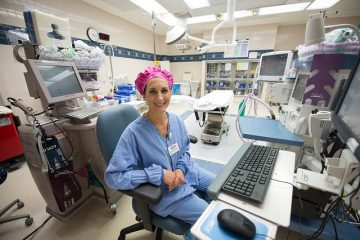 The University of Wisconsin Oshkosh is responding to a regional shortage of nurse anesthetists by offering Wisconsin’s first doctoral-level Certified Registered Nurse Anesthetist (CRNA) program.
The University of Wisconsin Oshkosh is responding to a regional shortage of nurse anesthetists by offering Wisconsin’s first doctoral-level Certified Registered Nurse Anesthetist (CRNA) program.
“I am pleased to announce that full accreditation by the Council on Accreditation of Nurse Anesthesia Educational Programs has been awarded to a new emphasis within our Doctor of Nursing Practice (DNP) program—the CRNA,” said UW Oshkosh College of Nursing Dean Leslie Neal-Boylan.
“In response to the statewide need for advanced practice nurse anesthetists, the College of Nursing (CON) and its clinical partners have developed a nurse anesthesia program to meet the specific healthcare needs of Wisconsin’s citizens in both rural and urban areas.”
The CON is accepting applications now for its inaugural class set to begin in June 2017.
With 30 percent of all CRNAs set to retire in the next five years, UW Oshkosh’s College of Nursing developed the program to help alleviate the shortage in Wisconsin and beyond.
“With the increasing need for CRNAs in the state, it has become apparent that additional CRNA programs within Wisconsin are essential,” said UWO alumnus Timothy Johnson ’06, who works as a CRNA with the U.S. Department of Veterans Affairs’ Green Bay Clinic.
“UWO has a rich, long-standing tradition of educating our future nurses. This is certainly exciting as these future CRNAs will be educated at the doctoral level of nursing and be trained within a new, state-of-the-art Simulation Lab on the UW Oshkosh campus.”
 The DNP is the highest level of education that prepares nurse clinical experts in specialized advanced nursing roles. The CRNA is UW Oshkosh’s second DNP emphasis. The first, the Family Nurse Practitioner emphasis, launched in 2010.
The DNP is the highest level of education that prepares nurse clinical experts in specialized advanced nursing roles. The CRNA is UW Oshkosh’s second DNP emphasis. The first, the Family Nurse Practitioner emphasis, launched in 2010.
Nanette Smith, a CRNA at Aurora Medical Center in Oshkosh, said the second DNP emphasis expands the profession and gives nursing students more options to study and continue working in the Fox Valley.
The rigorous three-year, full-time CRNA program will consist of 74 graduate credit hours in courses ranging from anatomy to pharmacology and from chemistry to pathophysiology. Clinical learning experiences will be available with clinical partners located throughout the Fox Valley.
Before heading out to their clinical settings, graduate students in the program will learn to work with the technology necessary to succeed in CRNA clinical practice through simulation with high-fidelity simulators, animal and cadaver models as well as other machines and equipment.
For more information, send an email to concrna@uwosh.edu.
Learn more:

